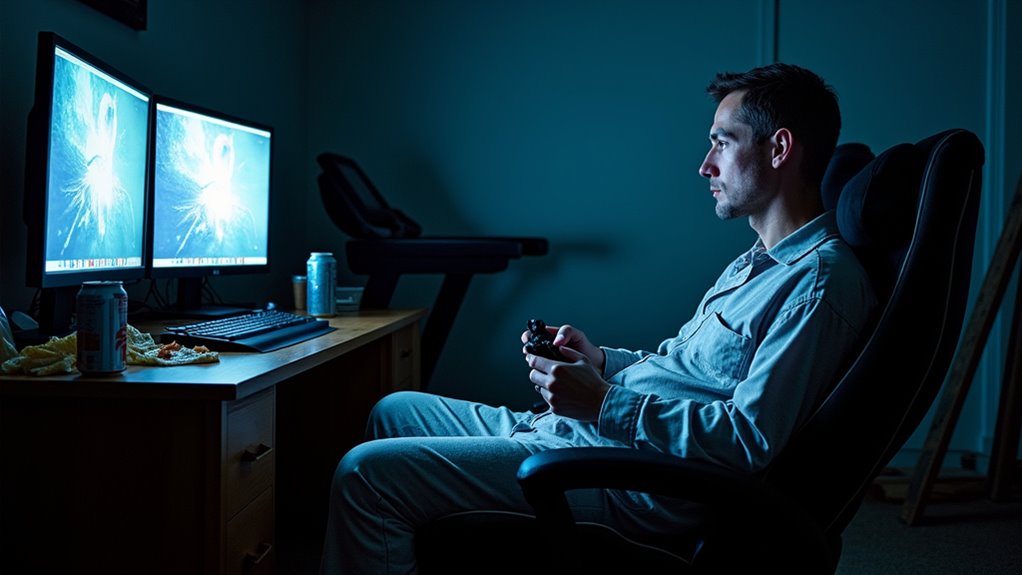You’ll spot gaming addiction in adults over 30 through subtle financial and physical warning signs. Watch for maxed-out credit cards from microtransactions, chronic back pain from extended gaming sessions, and declining workplace performance. Studies show 94% of gaming addicts are male, with a 34.4% professional burnout rate. If you’ve noticed irregular eating patterns, missed bill payments, or strained relationships, these red flags point to deeper underlying issues that require attention.
The Financial Red Flags: When Gaming Drains Your Wallet

While many adults view gaming as harmless entertainment, the financial impact of gaming addiction often manifests through subtle yet devastating patterns of spending. You might notice your credit cards maxing out from microtransactions or subscription fees, while investment opportunities lost pile up alongside delayed retirement savings. Warning signs include dipping into emergency funds for premium in-game items or neglecting essential bills to purchase virtual currencies. The sedentary lifestyle caused by excessive gaming often leads to increased healthcare costs from obesity-related conditions.
The financial strain extends beyond immediate purchases. You’re likely to see deteriorating credit scores from missed payments, reduced work productivity affecting your income, and mounting high-interest debt from cash advances. With online gaming revenue projected to reach $176.06 billion by 2023, the growing marketplace makes it easier than ever to overspend on digital entertainment. What starts as casual spending can escalate into serious financial distress, especially when you begin viewing gaming expenses as “necessary” despite their impact on your household budget and long-term financial stability.
Physical Health Decline: Beyond Poor Posture

While gaming addiction initially manifests in subtle physical changes, you’ll notice more serious symptoms emerge over time, including chronic back pain from prolonged sitting and deteriorating eye health from extended screen exposure.
Your body may undergo significant weight and muscle changes as regular physical activity decreases and eating patterns become irregular. These physical warning signs, when combined with poor posture and neglected personal hygiene, can signal a growing gaming dependency that requires professional intervention. Research indicates that gaming disorder treatment often requires cognitive behavioral therapy. Health risks also include repetitive stress injuries that can develop in wrists, fingers, and elbows from continuous controller or keyboard use.
Chronic Back Pain Patterns
Although gaming addiction affects multiple aspects of physical health, chronic back pain emerges as one of its most prevalent and debilitating consequences, with 52.1% of adult gamers reporting musculoskeletal pain in at least one body region. Your upper back faces the highest risk, showing a 3.75 times greater likelihood of developing chronic pain when gaming addiction is present. Studies reveal that males face 2.01-fold higher chances of developing gaming addiction compared to females. Children and teens commonly exhibit poor spine alignment during gaming sessions, which can develop into lifelong postural problems.
| Pain Location | Risk Factor | Primary Cause |
|---|---|---|
| Upper Back | OR: 3.75 | Forward Lean |
| Lower Back | Moderate | Poor Support |
| Neck | High | Static Posture |
You’ll need regular spinal adjustments and ergonomic assessments to address these issues, as prolonged gaming sessions beyond 4 hours daily drastically increase your risk of severe musculoskeletal discomfort. Poor posture habits and inadequate lumbar support during extended sessions can accelerate the development of chronic conditions, particularly affecting your spine’s natural alignment.
Deteriorating Eye Health
Beyond musculoskeletal issues, gaming addiction takes a severe toll on your eye health, with 67% of adult gamers reporting considerable digital eye strain. You’ll notice your eyes struggling to shift focus between near and far objects, experiencing peripheral vision disruptions, and developing accommodative rebound effects after extended gaming sessions. The intense visual engagement often triggers a state of chronic hyperarousal, making it difficult to transition to restful sleep.
Your risk factors multiply when you’re ignoring the 20-20-20 rule, as prolonged screen exposure leads to reduced blinking (affecting 26.2% of users) and persistent dry eyes. Those with pre-existing vision problems are especially vulnerable, as video game vision syndrome can significantly worsen existing eye conditions. The strain on your ciliary muscles causes temporary stereopsis deficits, impairing depth perception in both virtual and real environments. If you’re already dealing with refractive errors or binocular vision issues, excessive gaming will drastically worsen these conditions, potentially accelerating the progression of existing eye problems.
Weight and Muscle Changes
As gaming addiction tightens its grip, your physical health deteriorates through significant weight and muscle changes that extend far beyond mere posture problems. Extended gaming sessions force your body into prolonged periods of inactivity, leading to decreased muscle tone and potential weight gain. Your eating patterns become erratic, often favoring convenient but unhealthy snacks over balanced meals. Poor personal hygiene often accompanies these dietary issues, as basic self-care falls by the wayside.
The combination of irregular sleep patterns and metabolic disruptions triggers a destructive cycle. Sleep deprivation alters your hunger hormones, while gaming-induced stress can prompt stress eating. Meanwhile, your muscles begin to atrophy from constant sitting, worsened by neglected exercise routines. The impact multiplies as poor nutrition, inadequate sleep, and physical inactivity converge, creating a perfect storm that accelerates both weight fluctuations and muscle deterioration.
Career Impact and Workplace Performance

When gaming addiction seeps into professional life, the consequences can be severe and far-reaching. Studies show that 10% of adult gamers have lost jobs due to their gaming habits, primarily from chronic absenteeism and missed deadlines. You’ll notice impaired workplace reputations develop as colleagues and supervisors lose trust in your reliability, creating professional advancement roadblocks.
Your cognitive functions and decision-making abilities suffer as gaming preoccupation intensifies, leading to errors and decreased productivity. Work relationships strain as collaboration becomes difficult, and performance reviews reflect declining quality. The cycle worsens when you use gaming to cope with job stress and emotional exhaustion, particularly in high-demand positions. Since males are disproportionately affected, representing 94% of gaming addicts, workplace performance issues tend to impact men at higher rates. Research indicates low self-esteem often contributes to work-related gaming escapism, further compromising professional success. Without intervention, these patterns can lead to termination, limited career opportunities, and long-term professional setbacks that may prove difficult to overcome.
Relationship Strain: Marriage, Family, and Friends
While gaming can provide entertainment and stress relief, excessive gaming behavior often wreaks havoc on intimate relationships and family dynamics. You’ll notice social withdrawals as gaming takes precedence over family gatherings, date nights, and children’s activities. Individuals in their mid-twenties to mid-thirties typically spend six hours weekly gaming, leading to emotional disconnects with partners who report feeling neglected and unheard. World of Warcraft players are particularly susceptible to relationship issues due to the game’s immersive and time-consuming nature.
The strain manifests in multiple ways: postponed domestic duties, missed bedtime routines, and superficial conversations. Parents struggle to enforce screen time limits on children while battling their own gaming dependencies. About 7.3% of gamers show problematic patterns, prioritizing virtual achievements over caregiving responsibilities. Up to 6 million Americans currently experience gaming disorder, putting immense pressure on family relationships. These behaviors frequently trigger relationship conflicts, with partners staging interventions or threatening separation when gaming addiction severely disrupts family life.
Time Management Challenges at Mid-Life
Your declining work performance may be the initial red flag, as research shows 51% of workdays are spent on low-value tasks when gaming addiction disrupts professional focus.
While you’re living between virtual worlds and reality, the 26.9% of adults reporting poor work-life balance mirrors the struggle many gaming-addicted professionals face in maintaining boundaries. The average person has 300 minutes daily of leisure time that can easily be consumed by gaming habits. Checking your phone 60 times daily during work hours may signal an escalating gaming problem.
The spiral becomes evident when you can’t effectively manage your workload, contributing to the 34.4% burnout rate and potentially masking gaming addiction behind seemingly normal mid-life stressors.
Digital Life vs. Reality
How does a passionate gaming hobby transform into a digital life that overshadows reality? The shift often manifests through social connectivity decline, where you’ll find yourself choosing virtual worlds over real-world relationships. Your emotional investment withdrawal from physical interactions becomes apparent as online gaming communities take precedence.
| Digital World | Physical Reality |
|---|---|
| 8+ hour gaming sessions | Neglected family time |
| Online gaming friends | Declining real friendships |
| Virtual achievements | Missed life milestones |
| Digital social status | Weakened community ties |
| Immediate gratification | Delayed life progress |
You’re not just choosing between two activities you’re traversing between two distinct realities. The digital domain offers constant engagement and instant rewards, while real-life relationships and responsibilities require patience, vulnerability, and consistent effort. This imbalance often leads to a progressive detachment from meaningful offline experiences.
Work Performance Spirals Downward
The digital-reality imbalance often manifests most visibly in professional settings, where gaming addiction’s grip tightens around career trajectories. You’ll notice focus disruption emerging through missed deadlines, diminished meeting participation, and mounting task errors. When gaming sessions stretch into early morning hours, your circadian rhythm suffers, leading to next-day productivity decline.
The strain shows in output quality, as white-collar professionals increasingly prioritize gaming over career responsibilities. This creates a destructive cycle where work stress fuels gaming addiction, which further deteriorates job performance.
What begins as “relaxation” evolves into a pattern of work avoidance, with 67% of adult gamers experiencing professional impacts. You might find yourself rescheduling commitments repeatedly, using business travel as gaming opportunities, or masking device use during work hours.
Digital Escapism vs. Real-World Responsibilities
Gaming enthusiasts often slip into electronic domains as a refuge from life’s demands, creating a complex dynamic between virtual engagement and real-world obligations.
When you find yourself choosing digital realms over reality, emotional detachment and responsibilities neglect become evident through:
- Persistent avoidance of household duties, personal hygiene, and family commitments while gaming sessions stretch longer
- Substituting real-world relationships with virtual connections, leading to increased isolation despite online social activity
- Using gaming as your primary stress management tool, making it harder to develop effective real-life coping strategies
Research using the MTPI-R scale reveals that higher escapism scores directly correlate with avoiding real-world challenges. You’re particularly at risk when gaming becomes your default response to life stressors, creating a cycle where unresolved problems multiply while you seek refuge in simulated environments.
Warning Signs in Professional Adults
While professional adults may expertly mask their gaming addiction, distinct warning signs emerge in their work performance and daily conduct. You’ll notice a gradual social disconnect as they withdraw from workplace relationships and professional networks, often replacing real-world interactions with gaming communities. Professional priorities become jeopardized through missed deadlines, skipped meetings, and diminished quality of work.
| Warning Sign | Work Impact | Personal Impact |
|---|---|---|
| Extended Gaming | Missed Deadlines | Sleep Deprivation |
| Digital Escapism | Reduced Focus | Relationship Strain |
| Mood Regulation | Poor Performance | Physical Decline |
| Secret Gaming | Career Stagnation | Financial Issues |
You might observe colleagues gaming during work hours, concealing their activities through deceptive behaviors like clearing browser histories or making false excuses. Their career development stalls as gaming sessions take precedence over professional growth opportunities and skill advancement.
Frequently Asked Questions
Can Gaming Addiction Lead to Permanent Changes in Brain Chemistry?
Yes, gaming addiction can cause permanent changes in your brain chemistry, particularly through prolonged neurotransmitter imbalance and structural brain changes. You’ll experience downregulation of dopamine receptors, similar to substance addiction, which can persist without intervention.
While some changes may be reversible with moderate gaming habits, intensive gaming can lead to lasting alterations in your reward circuitry, prefrontal cortex, and emotional regulation systems. Recovery potential varies based on gaming duration and individual factors.
What Role Does Childhood Gaming History Play in Adult Addiction?
Your early gaming experiences establish critical developmental patterns that can shape your relationship with gaming throughout life. When you’re exposed to excessive gaming during childhood, you’re more likely to develop problematic gaming behaviors as an adult.
Parental influences, including supervision levels and gaming boundaries, substantially impact these patterns. Research shows your childhood gaming habits often predict future addiction vulnerability, especially if you experienced high engagement during formative years.
How Does Gaming Addiction Differ Between Men and Women Over 30?
You’ll notice distinct gender-based coping mechanisms in gaming addiction after maturity. Men typically show higher addiction rates and tend to use gaming as an escape from work stress, while women often game to manage emotional challenges.
Your gender influences how gaming habits develop men generally engage in competitive multiplayer games, whereas women prefer social and casual gaming. Parental gaming influences can shape these patterns early on, affecting later addiction risks.
Are Certain Game Genres More Addictive for Mature Adults?
You’ll find that certain game genres carry higher addiction risks for mature adults, with MMORPGs and RPGs leading the way. Your game preference factors often align with social gaming dynamics, making MMORPGs particularly compelling due to their continuous character progression and community involvement.
You’re more likely to develop problematic gaming habits with MOBAs and FPS games that offer competitive rankings and team-based gameplay, especially when they include daily reward systems and achievement tracking.
Can Gaming Addiction Coexist With High-Functioning Professional Success?
Yes, gaming addiction can coexist with professional success, as research shows even clinically addicted gamers (1.4%) may maintain their careers through effective work-life balance strategies.
You’ll find that most high-functioning gaming addicts develop healthy coping mechanisms like scheduling gaming around work hours or using gaming as a post-work reward. Data indicates that 7.3% of “problem gamers” and 3.88% of “engaged gamers” successfully manage professional responsibilities while maintaining intense gaming habits.






